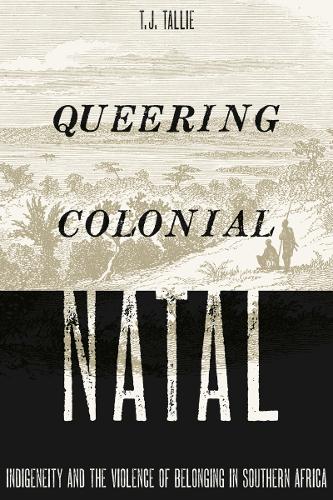
Queering Colonial Natal: Indigeneity and the Violence of Belonging in Southern Africa
(Hardback, 1)
Available Formats
Publishing Details
Queering Colonial Natal: Indigeneity and the Violence of Belonging in Southern Africa
By (Author) T. J. Tallie
University of Minnesota Press
University of Minnesota Press
1st February 2020
1
United States
Classifications
General
Non Fiction
Ethnic groups and multicultural studies
Indigenous peoples / Indigeneity
Politics and government
African history
Colonialism and imperialism
968.40049639
Physical Properties
Hardback
240
Width 140mm, Height 216mm, Spine 25mm
Description
How were indigenous social practices deemed queer and aberrant by colonial forces In Queering Colonial Natal, T.J. Tallie travels to colonial Natalestablished by the British in 1843, today South Africa's KwaZulu-Natal provinceto show how settler regimes "queered" indigenous practices. Defining them as threats to the normative order they soug
Reviews
"Brilliant, generous, and generative, Queering Colonial Natal seamlessly demonstrates why scholars of nineteenth-century South African history should read contemporary North American queer and indigenous history and vice versa. T.J. Tallie shows how and why South Africa should be in discussions of settler colonialism as well as how and why a global queer studies needs to pay attention to the history of a place like Natal."Neville Hoad, author of African Intimacies: Race, Homosexuality, and Globalization
"Sophisticated and brilliant. Queering Colonial Natal offers much needed interventions to ongoing conversations in settler colonial studies, queer studies, and Indigenous studies by expanding the geographies, political contexts, and theoretical stakes for historical analyses of white settlement and Indigenous resistances. In foregrounding case studies that expose the normative constraints white settlers imposed on Zulu as the exclusionary standards for civilized belonging, T.J. Tallie advances how critical Indigenous theory understands the colonial cacophonies of race, gender, and sexuality."Jodi A. Byrd, author of The Transit of Empire: Indigenous Critiques of Colonialism
"All in all, this is a wonderful and important book. It helps the audience understand and redefine contemporary heterosexual normativity beyond colonial Africa and links settler queering of indigenous Africans in Natal with Africas anti-gay rhetoric today (Tallie 2019, 188-189). Tallies depiction of the heteronormativity and global nature of settler colonization is truly valuable to anthropology, European Studies, and many other humanities and social science disciplines. Anyone who is interested in race in post-colonial societies or want to better understand todays issue with race should read this book."EuropeNow
"Queering Colonial Natal masterfully details the kinds of perpetual settler labor and vigilance required to respond to the indigenous African majority and the Indian migrant populations who were continually manipulating and shaping the settler order from the margins."GLQ: A Journal of Lesbian & Gay Studies
"Tallies book contributes to an in-depth understanding of the machinations of settler control as well as the deep fears and desires of the settler state."Gender & History
"Throughout the book, Tallies style is clear and elegant. When each chapter ended, I found myself wanting more of his commentary and analysis of the intricate race and gender dynamics that permeated nearly every part of life in Natal."Ethnic Studies Review
"This book is genuinely invaluable to diverse fields such as history, African queer studies, anthropology, and many other disciplines in the humanities and social sciences."Journal of African History
Author Bio
T.J. Tallie is assistant professor of history at the University of San Diego.
